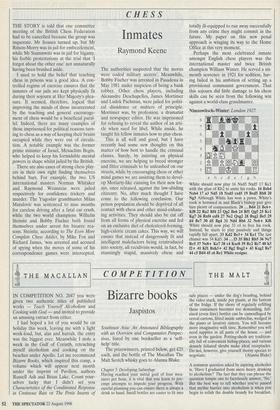CHESS
Inmates
Raymond Keene
THE STORY is told that one committee meeting of the British Chess Federation had to be cancelled because the group was inquorate. Mr Soanes turned up, but Mr Ritson-Morry was in jail for embezzlement, while Mr Stammwitz was in jail for bigamy, his feeble protestations at the trial that 'I forgot about the other one' not unnaturally having been brushed aside.
I used to hold the belief that teaching chess in prisons was a good idea. A con- trolled regime of exercise ensures that the inmates of our jails are kept physically fit during their sojourn at Her Majesty's plea- sure. It seemed, therefore, logical that improving the minds of those incarcerated by the teaching and general encourage- ment of chess would be a beneficial paral- lel. Indeed, there are many examples of those imprisoned for political reasons turn- ing to chess as a way of keeping their brains occupied while they were out of circula- tion. A notable example was the former prime minister of Israel, Menachim Begin, who helped to keep his formidable mental powers in shape whilst jailed by the British.
There are also cases of strong chess play- ers in their own right finding themselves behind bars. For example, the two US international masters Norman Whitaker and Raymond Weinstein were jailed respectively for confidence trickery and murder. The Yugoslav grandmaster Milan Matulovic was sentenced to nine months for careless driving after a fatal car crash, while the two world champions Wilhelm Steinitz and Bobby Fischer both found themselves under arrest for bizarre rea- sons. Steinitz, according to The Even More Complete Chess Addict, by Mike Fox and Richard James, 'was arrested and accused of spying when the moves of some of his correspondence games were intercepted. The authorities suspected that the moves were coded military secrets'. Meanwhile, Bobby Fischer was arrested in Pasadena in May 1981 under suspicion of being a bank robber. Other chess players, including Alexandre Deschapelles, James Mortimer and Ludek Pachman, were jailed for politi- cal dissidence or matters of principle. Mortimer was, by profession, a dramatist and newspaper editor. He was imprisoned for refusing to reveal the author of an arti- cle when sued for libel. While inside, he taught his fellow inmates how to play chess.
This is all well and good, but I have recently had some new thoughts on this matter of how best to handle the criminal classes. Surely, by insisting on physical exercise, we are helping to breed stronger and fitter criminals to be unleashed on our streets, while by encouraging chess or other mind games we are assisting them to devel- op Moriarty-like cunning for their new for- ays, once released, against the law-abiding citizenry. No, after much thought I have come to the following conclusion. Our prison population should be deprived of all contact with chess and other mind-enhanc- ing activities. They should also be cut off from all forms of physical exercise and fed on an exclusive diet of cholesterol-forming, high-calorie cream cakes. This way, we will ensure that instead of dangerously fit and intelligent malefactors being reintroduced into society, all recidivists would, in fact, be stunningly stupid, massively obese and totally ill-equipped to run away successfully from any crime they might commit in the future. My paper on this new penal approach is winging its way to the Home Office at this very moment.
Perhaps the most celebrated inmate amongst English chess players was the international master and twice British champion William Winter. He served a six- month sentence in 1921 for sedition, hav- ing failed in his ambition of setting up a provisional communist government. That this sojourn did little damage to his chess skills can be seen from the following win against a world-class grandmaster.
Nimzowitsch–Winter: London 1927.
White should now play 16 Nxd5 Nxd5 17 Kcl with the plan of Kb2 to unite his rooks. 16 Bxb4 Nxb4 17 a3 Nd5 18 Nxd5 cxd5 19 BxdS Rb8 20 Ng3 Although White has won a pawn, White's rook is hemmed in and Black's bishop pair give him plenty of compensation. 20 ...Bd4 21 Bc6+ Kf8 22 Ra2 Rf4 23 Qg2 Be6 24 Rfl Qg5 25 Kcl Kg7 26 Rxf4 exf4 27 Ne2 Qxg2 28 Bxg2 Bey 29 d4 Bc7 30 d5 Bg4 31 Nd4 Bb6 32 Ne6+ Kf6 White should now play 33 c4 to free his rook. Instead, he starts to play passively and things rapidly fall apart. 33 Kd2 Be3+ 34 Kel The last chance was 34 Kd3. 34 ... f3 35 Bhl Rb5 36 Nc7 Rc5 37 Ne8+ Ke7 38 c4 KxeS 39 Rc2 Rc7 40 h3 f2+ 41 Kfl Bxh3+ 42 Bg2 Bxg2+ 43 Kxg2 Re7 44 c5 Bd4 45 c6 Rel White resigns.
























































 Previous page
Previous page